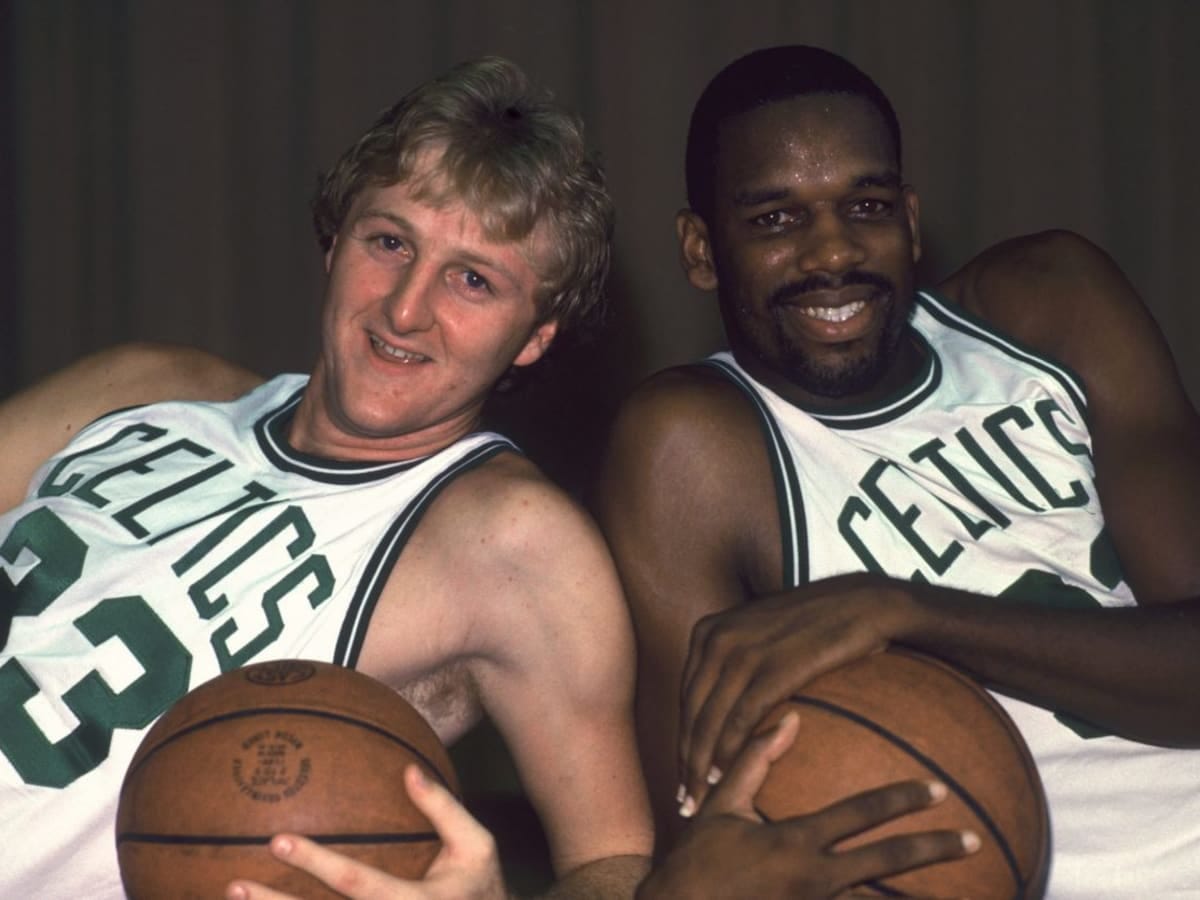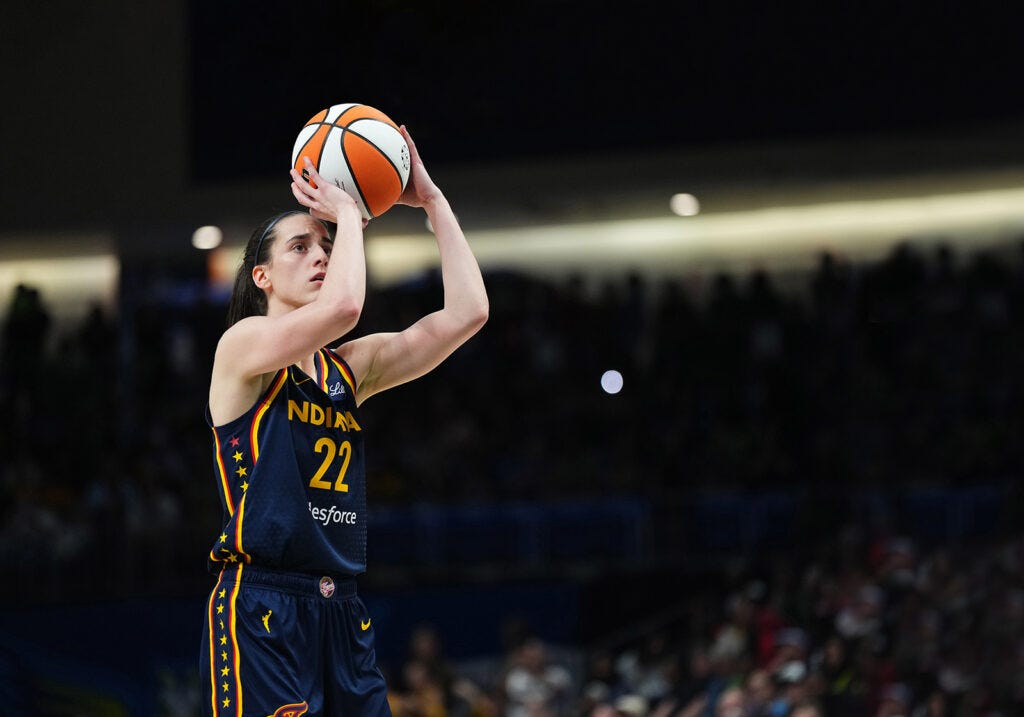Hi all,
I’ve long been a basketball fan — grew up a die-hard Laker fan. That is why when I saw ESPN’s 30 for 30: Celtics/Lakers: The Best of Enemies available on Netflix, I had to watch. It is a well done three-part series that goes into depth about what the NBA was like before the arrival of Magic and Bird and takes us all the way through their intense rivalry, including the racial controversies. If you were a fan then, you’ll feel the 80s all over again.
I was about half way through the first episode when I saw on X.com the latest racial controversy surrounding WNBA star, Caitlin Clark.
An All-American in high school, she rose to national prominence after leading Iowa University to two consecutive NCAA championship games — the last one taking place this past March. She then went straight into the WNBA after being selected first overall by the Indiana Fever in the draft. She set multiple records, made the WNBA All-Star team, and won the rookie-of-the-year award as well as a spot on the All-WNBA First Team.
Time Magazine chose to honor her with its “Athlete of the Year” award. What made this announcement on X controversial was that Clark said as a white woman she has privilege.
This declaration comes on the heels of numerous writers, pundits, and athletes saying for the past two years or so that her fame was largely due to her whiteness.
Jemele Hill, writer for The Atlantic, said, “We would all be very naive if we didn’t say race and her sexuality played a role in her popularity.” She added: "It’s not jealousy. It’s just the fact that in our society, black women are often erased from the picture.”
These racial overtones continued to build and when Clark entered the WNBA she was subjected to even more criticism — along with egregious fouls from opponents.
“I think a lot of people may say it’s not about black and white, but to me, it is,” Las Vegas Aces star A’ja Wilson said. “It doesn’t matter what we all do as black women, we’re still going to be swept underneath the rug. That’s why it boils my blood when people say it’s not about race because it is.”
Sheila Johnson, the billionaire co-owner of the Washington Mystics, wondered why Time Magazine couldn’t “have put the whole WNBA on that cover?” She added: “When you just keep singling out one player, it creates hard feelings.”
I guess the everybody-wins-a-trophy culture has reached the WNBA and since when did elite athletes care about feelings? Magic and Bird sure didn’t.
I had just watched a documentary scene on my television with Red Auerbach, the legendary Celtics owner, and couldn’t help but contrast his response to a racial question with Sheila Johnson’s. A reporter had asked Auerbach if incoming Larry Bird was the new “great white hope.” Auerbach smoked his cigar and then said, “No, great hope.”
That was the discipline that many people had back then. When “The Hick from French Lick” first arrived in Boston he didn’t know how he would be treated by the predominantly black Celtics, especially Cedric Maxwell. Bird said, “You go into these things and go, well, you don’t know how you’re going to be treated, but I ain’t taking no shit. If they want to go, we have to go.”
Maxwell recalled the first time he faced rookie Bird on the practice court: “I’m thinking, ‘Oh, he’s slow. He can’t get off his shot. He’s not that strong. This is going to be a lay-up.’ Bam! Knocks down a jump shot. ‘OK, maybe that was luck.’ Bam! Knocks down another jump shot. Now I’m thinking, ‘You know what, I’m going to D this guy up.’ 20 feet away, bam! 25 feet away, bam! On my mind constantly was just, ‘Damn, this white guy could play.’”
Bird wasn’t the only Celtic to put character and talent before race. M.L. Carr, the towel waving Celtic who trash talked the Lakers endlessly during the championship games, was from the segregated South when he landed in Boston in 1979 as a free agent. Boston had a notorious reputation for racism, especially after the desegregation and busing wars in the seventies. But Carr believed that racial tensions were rooted in people who did not know people who were different from them.
“I set out to have as many interactions as possible, knowing that the racial tensions were their problem and not mine,” Carr said. “I never took it personally because I had gone through it at a young age under worse circumstances.”
One day, a Boys and Girls Club from Boston’s “Southie,” an all-white neighborhood, asked the Celtics if a player could lead a basketball clinic. Carr volunteered. The youth club instead asked for a “white guy.” Carr said that wasn’t going to fly and went anyway. He put on “the best clinic of his life,” one that people still remember to this day because it broke the ice and introduced them to “the unknown.”
That is why it was disappointing to hear Clark reduce herself to white privilege in the Time Magazine article. “I’ve earned every single thing, but as a white person, there is privilege.”
She continued: “A lot of those players in the league that have been really good have been black players. This league has kind of been built on them…The more we can appreciate that, talk about that, and then continue to have brands and companies invest in those players that have made this league incredible, I think it’s very important.”
I don’t doubt Clark’s sincerity here. I can’t say for a fact so I have to assume here that her way of thinking is largely due to her generation — she was born in 2002. She grew up in times when race was more ideological than a reality. The words that Clark spoke were not her own words, words earned through actual experiences, but words that are ideological constructs crafted over the years by racial justice activists. This great athlete who honed her own individual style of play into one of such charisma that it draws major crowds, was simply conforming to cliched racial mantras.
I have a feeling that it sounded pleasing and virtuous to her ear and ego when she told Time, “The more we can elevate Black women, that’s going to be a beautiful thing."
Who’s the “we” here? White people? Whether she realizes it or not, she repeats here the old stigma of blacks as a perpetually helpless and discriminated against people who need elevating by others. Did Magic need Larry to elevate him? Kareem Abdul-Jabbar by Bill Walton? KC Jones by Pat Riley? And on. It is beyond time to retire this black victim-white savior insult once and for all.
The harsh reality is that it is one of the most difficult things to create a business, much less a sporting event, capable of generating a huge fanbase night after night — since its inception, the NBA has subsidized the WNBA. It is also absolutely rare that stars of absolute charisma come along — even the sheer talent of Abdul-Jabbar couldn’t generate the wattage that Magic’s smile could. And today we are left with the ugly reality that the WNBA generates more attention than ever partly due to the way some in the media and sports world have chosen to racialize Clark.
But, then again, this is nothing new in America. The Lakers and the Celtics went through this in the 80s when it was black LA versus white Boston. The difference between Bird and Clark is that Bird never took the race bait. He always chose the human side of things. When Detroit Piston Isiah Thomas repeated Dennis Rodman’s words that if Bird were black “he would just be another good guy,” the Celtic responded with classic bluntness: "The main thing is that if the statement doesn't bother me, it shouldn't bother anybody."
What happens on the court is what most of us care about. There’s no privilege on that court. Clark will learn one day that using race to help others will only lead to more problems — race is a poison that advances nothing and betters nothing but its own corrupted power. If she wants to truly be an asset to others she will have to move beyond performative race-signaling into the human realm — the realm that allowed her to reach great heights by instilling within herself the universal values of hard work, resilience, creativity, and merit.
As the Celtic-Lakers series on Neflix came to a close for me, Laker Byron Scott had the last word: “Magic Johnson and Larry Bird — it might have started off as a racial profiling with the two, but at the end of the day, it wasn’t about that anymore. It was about the game of basketball. It was about the rivalries and the beauty of the way these guys played the game.”
Have a great weekend,
Eli










Well said. For a while, it seemed like we had put a great deal of racism behind us. But once the left realized they could win elections by elevating racism we went backwards. From the 1619 project to BLM, the left saw the power of being racist.
One can't say exactly what Martin Luther King would think of today's racist movement, but it certainly seems the antithesis of his words that a person should be judged by the content of their character, rather than the color of their skin.
Eli, thanks again for great words of wisdom!